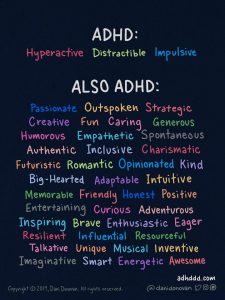By Dan Blair Marriage Counselor and Family Therapist
Managing a classroom takes a special set of skills. I have the utmost respect for teachers. Learning how to direct attention is challenging, especially for those bright and personable kids with ADHD, and those that fly under the radar that have ADHD.
Limiting distractions is like providing only one choice on a menu and hoping that it will be chosen. Kids can pay attention, and then forget to pay attention. Even when there is clear direction, regular cueing is essential. Perhaps a child that has difficulty paying attention can sit closer to the teacher, or study in a quiet location away from distractions. Structured settings help, and rules may need reminders, like written or pictorial cues that also indicate when the rule is to be followed. Reinforcements for staying on task are also needed, even if it’s social (by the teacher or peers working together) or rewards can be earned. (It works for credit card companies). Feedback can take the form of eye contact, a smile, praise, or pointing to a cue card. Even a regular auditory cue, such as a beep or a brief ringtone every ten minutes, can help someone stay on task.
Organization is the next challenge. Knowing where to find items using cueing may be needed. Labels, color-coding and routines are important. Perhaps written or pictorial checklists can be used that catch the child’s attention. For longer assignments or task, a checklist can be used to take one step at a time. These checklists, or assignment notebooks, can be checked by parents and teachers.
Taking breaks to allow energy to be vented can help a child pay attention. Time to get up and move can be built-in the daily routine at a higher frequency.
Finally, adaptations for assignments need to be part of the IEP.
For more information on ADHD, try The ADHD Book of Lists: A Practical Guide to Helping Children and Teens with Attention Deficit Disorders by Smart But Scattered: The Revolutionary “Executive Skills” Approach to Helping Kids Reach Their Potential by Dawson & Guare , or A Family-School Intervention by T. Power, J. L. Karutis and D. F. Habbouche. More online resources include ParentsMedGuide.org, and Children and Adults with Attention-Deficit/Hyperactivity Disorder. Helpful books that relate to social skills can be found at TheGrayCenter.org or Socialthinking.com.



